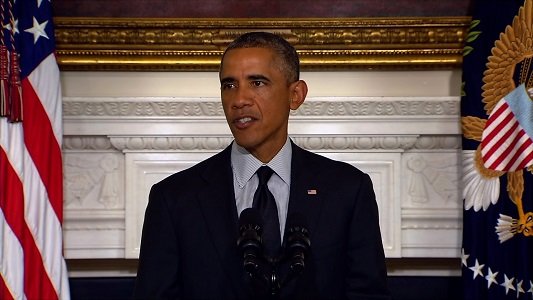In his speech last week outlining his plans to use military force against the jihadists of the Islamic State, President Obama gave Congress only passing mention. “I have the authority to address the threat from ISIL,” he said. “But I believe we are strongest as a nation when the president and Congress work together.” He is right, of course but that’s not the half of it.
Courtesy photo
Lee H. Hamilton
We live in troubled times, and over the last decade or two our military has been deeply involved somewhere in the world: Afghanistan, Iraq, Pakistan, Yemen, Libya, Syria… It’s a long list that will only grow longer as we’re called upon to use force in the future. Our process for deciding to use force, however, hasn’t caught up with these dangerous times. It has been decades since Congress asserted any meaningful role— pretty much everyone in the country, including most members of Congress, consider military intervention to be the president’s prerogative. Congress has been far too deferential: its members prefer to avoid a potentially difficult political vote, let the President take the lead, and then criticize him if he was wrong.
At the moment, much of the debate in the press and in Washington about the president’s intentions revolves around the legal justifications, which I find slightly amusing. The fact is that presidents always find the legal authority to take whatever action they believe is in the country’s best interest, and they have plenty of cards in their deck: self-defense, national security, protecting Americans, and their constitutional role as commander in chief.
Indeed, there are occasions when the President must act alone. If we’ve been attacked or hostilities are imminent or some emergency presents itself for which force is the only response, we’d expect the president to respond effectively. However, there are powerful political reasons for making the decision to use force abroad a joint one with Congress in all but emergencies.
When our nation must deal with controversial, complicated questions, there is great value to making the president articulate his analysis of the situation and the reasons for his decisions, and to test that thinking beyond close advisors who naturally tend to support him. The best place to do so is in Congress, where fresh eyes and an independent point of view will produce tough questions. Invariably, the result is a refined White House policy and a better understanding of it by the American people. This is unequivocally what Americans want. Even now, as a large majority of Americans support military action against ISIS, they also want Congress to weigh in, with more than 70 percent in a recent CNN poll believing President Obama should seek Congress’s backing for military strikes.
This may be because Americans understand innately that military action supported by both the President and Congress carries more legitimacy at home and more conviction abroad. Internal debate on foreign policy unsettles our allies, who begin to doubt the sustainability of our chosen course. The U.S. is in a far stronger position before the world if it is clear that the branches of government are unified and are speaking with one voice as a nation.
Though my chief concern is with the politics of authorizing force, there is one legal argument I find paramount. It is common wisdom that our Constitution is ambiguous on this subject, since it makes the president the commander in chief, yet gives Congress the ability to declare war. In a sense, though, the Constitution’s message is anything but ambiguous: by giving a role to each branch, it clearly considers the use of force to be a shared decision.
This imposes a responsibility on Congress. Our system is built on the notion that Congress cannot be a bystander when it comes to the grave decision to use our military abroad. It, too, needs to take ownership of decisions to use force, for the good of the American people’s understanding and acceptance of the issues at stake, and for the benefit of the nation’s profile abroad. Congress needs to assert this role, not hide behind the expediency of letting someone else make the decision and the president should embrace it.

